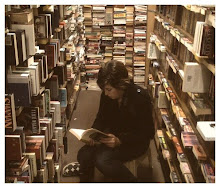Has it always been the case that we feel the need to disregard- to clean up- all the negativities of our lives? I thought the "Pleasantville" mannerisms had passed away a couple decades ago, but apparently I was wrong. I see it in myself and the people around me; we come across an ounce of depression in our lives and we feel the need to wash it out.
We don't want to deal with sadness, personally.
The people around us don't want to see us sad.
There may be more causes, but I think the above two statements are the main reasons we denounce grief. And the sad thing is that our attempts to live lives of near-constant happiness is impossible. And the sadder thing is that the expectation that our lives should consist of near-constant happiness only depresses us. Do you see how unproductive this is?!
We see sorrow as a germ- an invader, and we cleanse our minds of it just as we cleanse our houses. Our minds become as superficially white as a suburban countertop, and when guests come to visit they're impressed with our cleanliness- they can eat off our windexed linoleum, but watch them get sick later (no really- my friend had a cat that died from licking their chemically "cleansed" kitchen floors). What I am trying to get across here is that a mind washed of sorrow is false, unsustainable and unhealthy: it is lying to itself and everyone around them.
To add to the metaphore-- as society "progresses", we have invented new ways to avoid sorrow-- soaps of higher potencies. For instance, anti-bacterial soap. It's a nice idea; we can completely sterilize ourselves, at the same time we weaken our immune system and disable ourselves from naturally protecting ourselves from bacteria. What is an anti-depressant but a sort of acti-bacterial soap. It is supposed to psychologically sterilize us of depression, but we loose our natural ability to deal with life. Yes- life, of which depression is involved!
I AM SO TIRED of simplifying existence to keep things light and positive. Of being so unambitious in understanding my emotions that I limit myself to believing that "happy"=good! and "sad"=baaaaad. How immature! I am sick of not expressing myself because when I start a sentence with "I'm depressed..." I am told to see a doctor. Why is the average emotion contentedness? I am never content.
I felt terrible for a while- thinking that the everyone around me woke up in the morning and felt happy. And the more I attempted to be happy, the more depressing life got.
My advice to (firstly) myself and (secondly) the world is: never tell yourself to think positively. I could say that life oscillates through emotions, but even that is superficial. The fact is that I feel what I feel. I don't attempt to alter the weather, so why alter my mind?
Those Who Seem To Know (Me)
5 o'clock on friday night and the weatherman is making predictions.
Statements of, "You can count on a sunny day!", or,
with a corny smile, "I'm sure everyone'll be out and about this weekend!"
Are directed at me,
And I am... impressed- or even envious.
Their conviction is convincing.
I dress in shorts on saturday morning.
While the sky is clear, and the sun is shining
I am freezing.
Was I fooled?
They had me believing that the world was packing a picnic today--
Setting up beach chairs, and swimming in the ocean.
I tested the water, and turned blue.
I feel so alone.
The fact is alienating-- that the 2% chance of rain chose to pour on my doorstep.
Is there something wrong with me?
My circulation must be poor; I'm not pumping enough blood to stay warm,
So I take medication to keep my heart going--
Prescribed by doctors.
With their PHDs, they declare to understand me.
Then why do my symptoms persist?
Now I'm incompetent--
Unable to independently get my own organs to function!
Last night I left my bottle of pills outside.
You claimed it would be a starry-clear night,
But I woke to find the tablets dissolved in rain water.
Seems you- weatherman- can't predict the weather of my life any better than I can.
